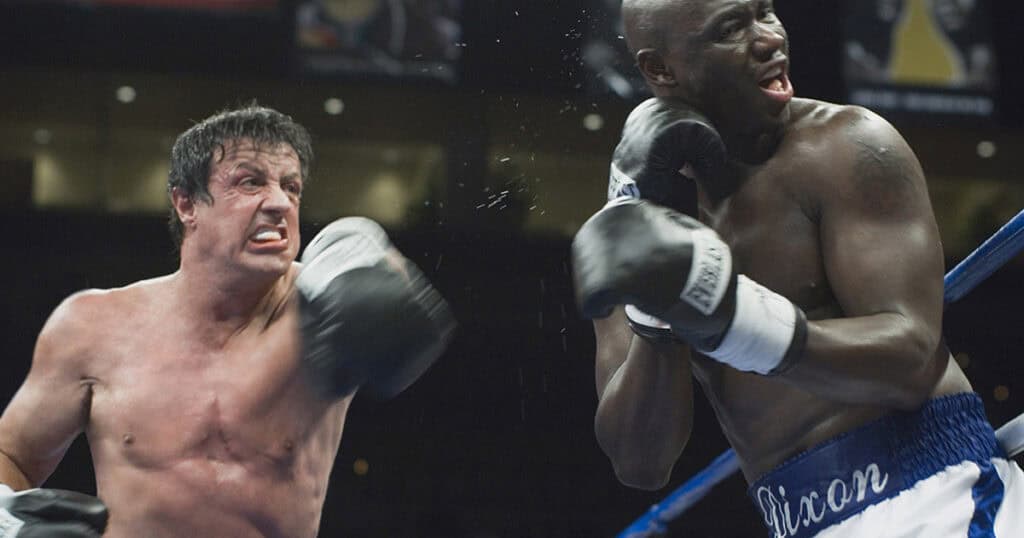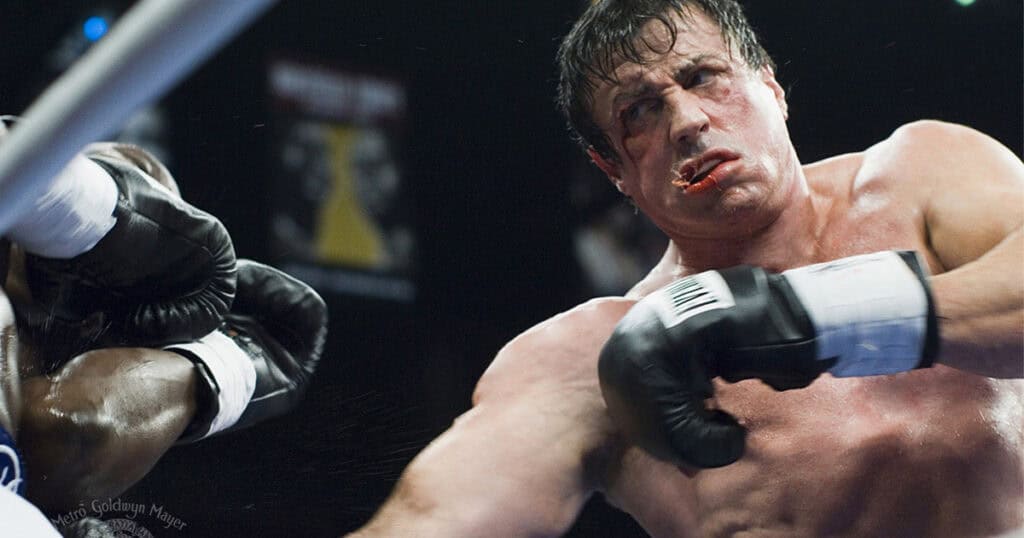
The early 2000s were a bad time for Sylvester Stallone professionally. In the mid-nineties, after a short-lived resurgence of three hit movies, Cliffhanger, Demolition Man and The Specialist, Stallone’s career as a bankable action star began to sputter, with Judge Dredd, Assassins and Daylight all losing money. Copland, an indie drama directed by James Mangold, made money and earned Stallone his best reviews since the original Rocky, but his follow-up movies were disastrous. His attempt at a slasher/ horror movie, D-Tox, sat on the shelf for years, finally being released under the lame title Eye See You. His 2000 remake of Get Carter was another disaster, with critics eviscerating him for remaking the Michael Caine classic, with even a cameo from Caine himself not easing their fury. In 2001, he teamed with Cliffhanger’s Renny Harlin on a go-for-broke would-be blockbuster called Driven.
Sporting a huge budget, for the time, a lot went wrong with Driven right off the bat. Stallone had intended to make a Formula One racing epic but eventually made it about the short-lived CART open-wheel car racing organization. To put it into context, imagine Oliver Stone had made Any Given Sunday about the XFL instead of the NFL. The film flopped badly, which wasn’t helped by the fact that the originally planned 3-hour epic was cut down to two hours, with some terrible continuity errors apparent throughout the film. Indeed, the DVD has 51 minutes of deleted footage. For Stallone, it was an embarrassing failure and a movie he always says he wished he had never done.
It was at this point that Stallone’s career, for a while anyway, seemed over. He starred in the direct-to-video mafia comedy Avenging Angelo and an indie movie called Shade, which also went direct to video. His highest-profile role was as the villain in Robert Rodriguez’s Spy Kids 3D. Stallone mostly focused on TV, with a recurring role in Las Vegas opposite his old buddy James Caan and the reality TV show The Contender.
All in all, it was a bad time for Stallone’s career, and it seemed he would never recapture his former glory. But, here’s the thing – failure can sometimes be a great motivator, and as Stallone himself revealed in Rocky III, when you lose the “Eye of the Tiger”, you have to get it back. If you watch the Rocky series, it’s not hard to escape that in his later-era films, Stallone had become an Apollo Creed-esque figure. But Stallone had a plan. He put pen to paper and began planning a comeback vehicle where he’d once again play his most enduring role, Rocky. Indeed, the character had saved his career from purgatory twice before, with Rocky II his post-Paradise Alley and FIST comeback. At the same time, Rocky III put him back on top after a slew of early eighties flops.

It wouldn’t be easy, though. Stallone was no longer bankable. While all the Rocky movies (except the first) had been relatively lavish productions, Stallone would have to make do with a relatively threadbare budget this time and a shorter shooting schedule than he was used to. The consensus among studios was that, given the fact that Rocky V was a flop, the series was done.
Stallone thought differently. Rocky V had never sat well with him, nor did the idea of retiring Rocky due to a potentially fatal brain injury. After watching George Foreman become the oldest heavyweight boxing champion in history, Stallone began plotting Rocky’s return. It took years for him to refine the story, and some hard choices were made along the way. The most grave of all of these was the fate of Talia Shire’s Adrian. Shire, of course, is still alive and well and quite close with Stallone. But, as he was writing the film, he realized Rocky’s comeback would be more dramatic were he to have lost the one person who always believed in him – Adrian. As such, he killed her off, which gives the character a lot more pathos in that he no longer has her to lean on.
In Rocky Balboa, some of the events of Rocky V are ignored, with Balboa no longer as financially down and out as he was in the last film. He’s a successful restauranteur, owning an Italian eatery called Adrians, where he regales patrons with stories about the glory days and his friendship with Apollo Creed. It’s a satisfying place for the Italian Stallion to end up with his son, Robert, now played by Milo Ventimiglia, a young lawyer from whom Rocky is slightly estranged. In the movie, Sly is lured out of retirement when the current champ, Mason “The Line” Dixon, played by real-life champ Antonio Tarver, is ridiculed for never facing a true champ and is infuriated by an ESPN simulation that suggests Rocky Balboa, in his prime, would have beaten him. His managers want him to get some goodwill, so they challenge Rocky, who’s regained his boxing licence.
As far as the Rocky movies go, some great pains were taken to make this realistic. For one thing, Mason Dixon is far from a villain, with him just a perhaps slightly egotistical boxer, and the movie never pretends Rocky could defeat him in a battle due to the age difference. Still, when Mason injures his hand, the fight becomes closer than expected, with Mason finally meeting an opponent with real heart and Rocky getting to let loose some of the stuff that’s “in the basement.”

One thing that surprised viewers of Rocky Balboa in 2006 was how incredible the writing was, with some of Balboa’s dialogue becoming much meme’d in the following years. The fight scenes in the film were also stripped down compared to the bouts from the OG series, with Stallone saying they used more realistic sound fx in the fights to make them lower-key and more realistic. The film also offered the late Burt Young a great final turn as Paulie, with him showing more pathos than ever in his final entry into the series, while Geraldine Hughes delivers a great performance as Marie, the now grown version of the young woman who famously called Rocky a “creepo” in the original film.
When it came out over the 2006 Christmas holiday, Rocky Balboa, which box office forecasters predicted would flop, was a surprise hit. It grossed $70 million domestically plus another $85 million internationally on a modest $24 million budget. Even the critics who slammed the last few Rocky movies couldn’t deny that once that classic Bill Conti music started up, it was hard not to get invested again in the Italian Stallion. Most notably, it kicked off a great career resurgence for Stallone, who wound up recapturing the zeitgeist in a way his contemporaries like Arnold Schwarzenegger never quite managed. While he likely thought he was done with Rocky Balboa after delivering a satisfying end to the saga, this didn’t prove to be the case when a young director named Ryan Coogler came knocking. But that’s a story for another day, but as it is, Rocky Balboa is a strong entry into the saga and finally gave Stallone a comeback that’s worthy of him.
The post Rocky Balboa: the movie that put Sly back on top appeared first on JoBlo.
Leave a Reply